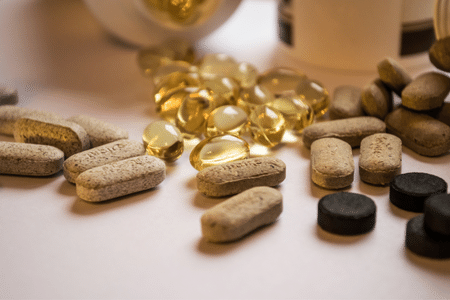Benefits of Multivitamins for Men—How to Use Them for Maximum Benefits
The world of supplements is vast, and if you’re like most people, a bit confusing and intimidating to sort through all of the information. With approximately 29,000 supplements on the market today (just in the US) and around 1,000 more added to the mix annually (also just in the US), you’d hardly be to blame. [According to the FDA]
Whether you’ve been taking supplements for years “just because” or are asking yourself whether you should be, follow our Supplement Series for an overview of the whats, whys, and whos of individual supplements. (And please read our disclaimer at the end of this post.)
Multivitamins have been on the rise in recent years. There’s a supplement out there for almost any health issue. You may be familiar with the wide variety of options for women’s vitamins. But men’s vitamins are just as abundant. So what are the benefits of multivitamins for men? What should you look for in such a supplement, and when should you take it? And do you really need to take one to be healthy?
In an ideal world, you wouldn’t. You’d get all your essential nutrients from foods. But our lifestyle nowadays doesn’t always allow us to get all our vitamins and minerals from food alone. Multivitamins can come to the rescue. They can help you get through times of high stress, improve your physical stamina, and much more. Here’s everything you need to know about supplementation for men.

When should men consider taking a multivitamin?
There are various moments in life when supplementing is beneficial. These include:
- Whenever you have a deficiency. This should go without saying, but supplement whenever you find out you have a vitamin or mineral deficiency. Your doctor will help you find the best dosage for your body.
- When you take medication that depletes nutrients. Examples include medication to lower cholesterol and triglycerides and even anti-acids.
- When you have dietary restrictions. Short-term dietary restrictions, such as going on a cleanse or a detox diet, can deplete your nutrients. Long-term restrictions, regardless of their cause, hit the body the hardest. For instance, someone with a seafood and nut allergy might have difficulty getting omega-3s in their diet.
- If you have a malabsorption disorder. People living with Celiac disease, Chron’s, ulcerative colitis, or those who had bariatric surgery have a hard time absorbing nutrients from food.
When you go through a very stressful time. This includes both mental and physical stress. With mental stress, you’ll want to focus on things such as magnesium, zinc, and antioxidants. With physical stress, including intense workouts, supplements that boost your energy will be better.

What are the best supplements for men?
When choosing your supplements, you need to look at a few factors.
- Do you have any pre-existing health conditions? If yes, it’s best to talk to a healthcare provider before taking any supplements.
- Do you know you have a nutrient deficiency? If yes, supplement accordingly. Again, a healthcare provider will help you choose the best dosage.
- What are your goals? Are you trying to lose weight? Maybe you want to gain muscle? Or perhaps you just need something to help you get through a stressful period? Your goal will show you where you should focus. For instance, magnesium will be a good choice in times of stress. A daily multivitamin might be the best choice if you’re trying to lose weight through dieting and working out.
- How old are you? Your nutrient needs will be different in your 20s or 30s than in your 60s. In your 20s, you might focus on things that help you gain muscle and be stronger. But as you age, your focus may shift towards heart health or cognitive function.
Beyond these factors, there are some vitamins and minerals that help boost men’s health throughout their life.
Vitamin D
Did you know some studies show men might be more at risk for vitamin D deficiency than women?
Vitamin D is essential for bone health and may help prevent various chronic diseases. It also affects immunity, muscle function, and even cell growth. Ideally, you’d be getting your vitamin D from sunlight. But that’s not always possible.
Spending a lot of time in the sun might not be ideal for everyone. Plus, clothing and even sunscreen might block vitamin D absorption. Finally, if you have darker skin, you’re more at risk for vitamin D deficiency.

Zinc
Zinc is an essential mineral for men. Studies show it helps your body make more testosterone. Plus, it can improve immunity and general well-being. Zinc levels decline with age, so make sure you get adequate levels through diet or supplementation at all times.
Research in the area is still ongoing. But one study looked at the effects of magnesium and zinc supplementation in men. The conclusion was that those who took 30 milligrams of zinc daily had an increase in free testosterone levels.
Another study showed zinc supplementation doesn’t affect testosterone levels if the person gets enough of the mineral from food. This proves, yet again, that the best way to get all your nutrients is through food.
Vitamin B12
Vitamin B12 is essential to brain health and helps produce red blood cells. It is found in animal products such as meat, seafood, and eggs. If you eat a vegan or vegetarian diet or simply try to limit animal products for health reasons, you’re at risk for vitamin B12 deficiency.
Omega-3
Omega-3 fatty acids play an essential role in men’s health. They help improve heart health and joint health, and they may prevent stroke and cognitive decline.
Fish and seafood are the best-known omega-3 sources. But you can also get it from nuts, seeds, and leafy greens.

Benefits of multivitamins for men
Now that we have a general idea of the essential vitamins and minerals for men and when you should take them, let’s see what their benefits are.
Improved cognitive function
Cognitive decline with age is something we can’t escape. But that doesn’t mean there’s nothing we can do. Living a healthy lifestyle with a balanced diet and some exercise is the first step towards improving our cognitive function. Ensuring you get all your vitamins and minerals is the next.
Vitamin D and B12 are both essential to brain health. As we previously saw, men might be more at risk for vitamin D deficiency. As for B12, the body has a harder time processing it as you age. So even if your diet has plenty of animal products, supplementation could still be helpful and will help protect your brain against cognitive decline.
Boost the immune system
Vitamins and minerals are essential to a well-functioning immune system. Zinc and vitamin C are great supplements for immunity. But they’re not the only ones.
B vitamins, vitamin D, and even minerals like magnesium all work together to make sure your body functions optimally.

Helpful when working out
If you love lifting weights or doing cardio, you may sometimes need a nutrient boost. Multivitamins, especially those containing B vitamins and vitamin D, magnesium, and zinc, can protect your bones and muscle function. As a bonus, they can also help boost your energy.
And if you’re also watching your diet, there’s a good chance you’re not getting all the essential nutrients from food, so a multivitamin could be a great ally.
Don’t forget you can’t out-supplement an unhealthy lifestyle, so get plenty of sleep and water after your workouts.
Improved heart health
Heart disease is one of the top causes of death in the US. According to the CDC, one person dies of cardiovascular disease every 34 seconds!
Oxidative stress and a sedentary lifestyle are contributing factors. While you may not be able to change your job or where you currently live, you can take small steps to reduce your risk of cardiovascular disease.
Eating a balanced diet, reducing stress, and working out are very effective ways to do this. Multivitamins can also come to the rescue, especially when you don’t have an ideal diet. Focus on supplements that contain antioxidants, which help fight oxidative stress the most.

Do multivitamins for men have any side effects?
Multivitamins rarely have serious side effects. To minimize your risks, take them as instructed. Unless your doctor recommends otherwise, don’t take more than the daily recommended amount.
The most common side effects are digestive issues, such as stomach aches, diarrhea, and constipation.
They usually subside within a few days. If they don’t, consider changing the timing of your multivitamin. For instance, some people have trouble taking supplements on an empty stomach. Taking them later in the day, with food, could solve the problem.
Rarely, allergic reactions are also possible. These are usually because of other ingredients found in the multivitamins. If you notice a rash, itching, swelling, or difficulty breathing, stop taking the supplements immediately and talk to a doctor.

Key takeaways
Getting all your nutrients from food is the best thing you can do for your body. Sometimes, however, you might need a little help in the form of supplements.
Some of the key benefits of multivitamins for men include:
- Boosting energy and immunity
- Helping with performance during workouts
- Improving your body’s resistance in times of stress
- Fix nutritional deficiencies when your diet is less than ideal
- Help with low testosterone
- Improve heart and brain health and reduce cognitive decline as you age
If you’re looking for a multivitamin to support you wherever you are on your journey, check out our shop for some high-quality supplements.

Health/Medical Disclaimer
This blog post does not provide health or medical advice. This blog post is for informational and educational purposes only and is not a substitute for professional health or medical advice. Before taking any actions based upon such information, we encourage you to consult with the appropriate medical and healthcare professionals. We do not provide any kind of health or medical advice. The use or reliance of any information contained on this blog is solely at your own risk.
Sources
https://pubmed.ncbi.nlm.nih.gov/29558445/
https://pubmed.ncbi.nlm.nih.gov/29705881/
https://www.asep.org/asep/asep/BrillaV2.PDF
https://www.nature.com/articles/1602899
https://www.cdc.gov/heartdisease/facts.htm
Recent Posts
-
Are sunscreen ingredients harmful?
Sunny days can bring a lot of fun. Going out for a swim, spending time in nature, or relaxing on the …18th Mar 2024 -
The Veggie Debate: Does Cooking Vegetables Destroy Nutrients and the Best Ways to Cook Them
Vegetables are one of the healthiest foods you can choose. Some people downright hate them, while so …4th Mar 2024 -
Best Foods for COVID Recovery and Prevention
A few years ago, a new virus took the world by surprise. COVID-19 may look like the flu on the surfa …19th Feb 2024




